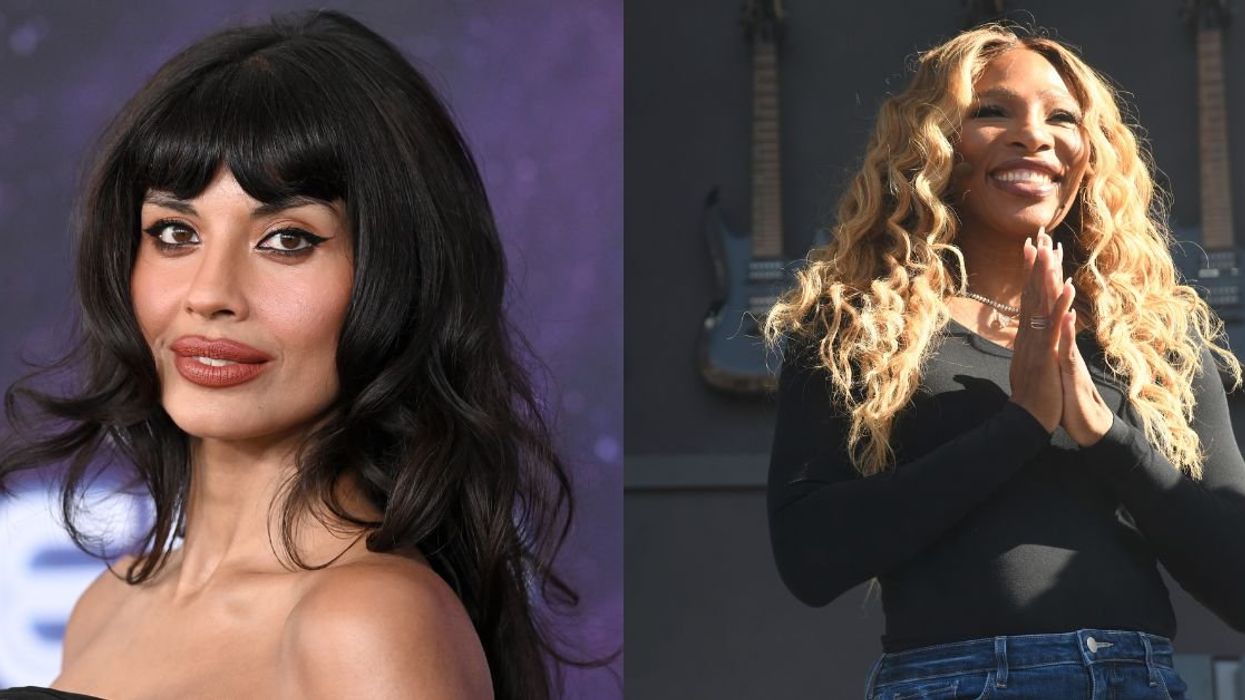Heads up, dear readers: This article dives into weight loss drugs, diet culture, body image, and celebrity endorsements. Read with care—and maybe a healthy dose of side-eye and snark.
When Serena Williams revealed she had lost 31 pounds with the help of a GLP-1 medication through the telehealth platform Ro, the internet responded as it always does: part applause, part skepticism.
Among those raising an eyebrow was actress and body-positivity advocate Jameela Jamil, who admitted on Instagram that the announcement made her feel, well, “uncomfortable.”
It all started when the 43-year-old Grand Slam champion appeared on the Today Show to explain her struggle, saying that no matter how much she trained, ran, or even logged 20,000 steps a day, her body didn’t bounce back after the birth of her second daughter.
Now a paid spokesperson for Ro, Williams shared her frustration with trying every diet imaginable—vegan, vegetarian, high-protein—without seeing results.
Williams revealed:
“As a woman, you go through different cycles in your life."
"No matter what I did—running, walking, I would walk for hours because they say that's good, I literally was playing a professional sport—and I could never go back to where I needed to be for my health."
"Then, after my second kid, it just even got harder. So then I was like, OK, I have to try something different.”
Since starting the medication, she says her blood sugar levels have stabilized and her joints feel “lighter, like they’re not bearing as much weight.”
Williams also stressed that this wasn’t about chasing aesthetics, but managing her long-term health as a Black woman, pointing out that diabetes runs in her family. However, African Americans do face long-standing inequities in healthcare access—often rooted in structural racism—that make them less likely to be prescribed or receive GLP-1 medications.
Having done the research and asked the tough questions, Williams added:
“As an athlete and as someone that has done everything, I just couldn't get my weight to where I needed to be at a healthy place—and believe me, I don't take shortcuts… I definitely had struggles because, I mean, I believed it too."
"But with Ro, I could easily just ask all the questions, and ... I didn't have to worry about it, and not have to feel like someone was looking at me sideways.”
You can watch the full interview below:
- YouTubeToday/YouTube
But while Williams emphasized health, Jamil was busy side-eyeing the sales pitch.
Taking to Instagram, Jamil wrote:
“Serena Williams is selling GLP-1s. The thing I feel most uncomfortable about here is that celebrities have access to doctors most others don't have access to. These 'miracle' weight loss drugs come at a price…”
And Jamil wasn’t being dramatic there. GLP-1 medications can easily run several hundred to over a thousand dollars a month without insurance. Even with "discounts," Wegovy and Zepbound come in at roughly $499 a month, with Wegovy’s starter dose at $349. Budget-friendly, this is not—especially in 2025’s wallet-crushing economy.
Jamil also pointed out that Williams’ husband, tech investor Alexis Ohanian, has financial ties to Ro dating back to 2018—something the company later confirmed to Reuters. “Another reason we should take every celebrity endorsement with a pinch of salt,” she added.
Check out Jamil’s full post here as she discusses the potential risks and side effects of GLP-1s — a friendly reminder that a celebrity testimonial is not a substitute for medical advice:
Cue the backlash memes. Critics accused Jamil of tearing down another woman’s personal health choice, prompting her to clarify.
Posting again on Instagram, Jamil tried to explain:
“I also wrote a lengthy substack defending Serena's right to do WHATEVER she wants with her body. Her body has been policed enough over the decades. It's not about her or her choice. It's about how celebrities promote drugs and diet products. All gloss, none of the inconvenient truths…”
You can read the rest of her post here:
And that’s the heart of the debate: was Williams wrong for being transparent about a decision she described as doctor-guided, or does Jamil have a point that celebrity endorsements blur the line between empowerment and pharmaceutical marketing?
The conversation is especially loaded given Williams’ long history of being policed for her body—through racist caricatures, sexist commentary, and endless scrutiny of her physique. Jamil, meanwhile, has built her brand on fighting toxic diet culture, launching her I Weigh movement in 2018 to challenge impossible beauty standards.
And unsurprisingly, social media had thoughts: half the comments hailed her remarks as a needed reality check, while the other half accused her of missing the point:
What’s clear is that Williams isn’t alone in this GLP-1 trend. Oprah Winfrey, Rosie O’Donnell, Meghan Trainor, Tracy Morgan, and Kendra Wilkinson have all openly discussed using weight-loss drugs. In other words: welcome to Hollywood’s Ozempic Hour, where even the most celebrated athletes and cultural icons can’t escape scrutiny from the court of public opinion.
Because if Serena Williams—arguably the greatest athlete of our generation—can’t escape body-shaming discourse, what chance does anyone else really have?








 Roberto Schmidt/AFP via Getty Images
Roberto Schmidt/AFP via Getty Images





 u/pizzaratsfriend/Reddit
u/pizzaratsfriend/Reddit u/Flat_Valuable650/Reddit
u/Flat_Valuable650/Reddit u/ReadyCauliflower8/Reddit
u/ReadyCauliflower8/Reddit u/RealBettyWhite69/Reddit
u/RealBettyWhite69/Reddit u/invisibleshadowalker/Reddit
u/invisibleshadowalker/Reddit u/Wishnik6502/Reddit
u/Wishnik6502/Reddit u/kateastrophic/Reddit
u/kateastrophic/Reddit u/blking/Reddit
u/blking/Reddit u/SlagQueen/Reddit
u/SlagQueen/Reddit u/geezeslice333/Reddit
u/geezeslice333/Reddit u/meertaoxo/Reddit
u/meertaoxo/Reddit u/crystal_clear24/Reddit
u/crystal_clear24/Reddit u/stinkpot_jamjar/Reddit
u/stinkpot_jamjar/Reddit
 u/Bulgingpants/Reddit
u/Bulgingpants/Reddit
 @hackedliving/TikTok
@hackedliving/TikTok @hackedliving/TikTok
@hackedliving/TikTok @hackedliving/TikTok
@hackedliving/TikTok @hackedliving/TikTok
@hackedliving/TikTok @hackedliving/TikTok
@hackedliving/TikTok @hackedliving/TikTok
@hackedliving/TikTok @hackedliving/TikTok
@hackedliving/TikTok @hackedliving/TikTok
@hackedliving/TikTok @hackedliving/TikTok
@hackedliving/TikTok @hackedliving/TikTok
@hackedliving/TikTok
 @vanderjames/Instagram
@vanderjames/Instagram @vanderjames/Instagram
@vanderjames/Instagram @vanderjames/Instagram
@vanderjames/Instagram @vanderjames/Instagram
@vanderjames/Instagram @vanderjames/Instagram
@vanderjames/Instagram @vanderjames/Instagram
@vanderjames/Instagram @vanderjames/Instagram
@vanderjames/Instagram @vanderjames/Instagram
@vanderjames/Instagram @vanderjames/Instagram
@vanderjames/Instagram @vanderjames/Instagram
@vanderjames/Instagram